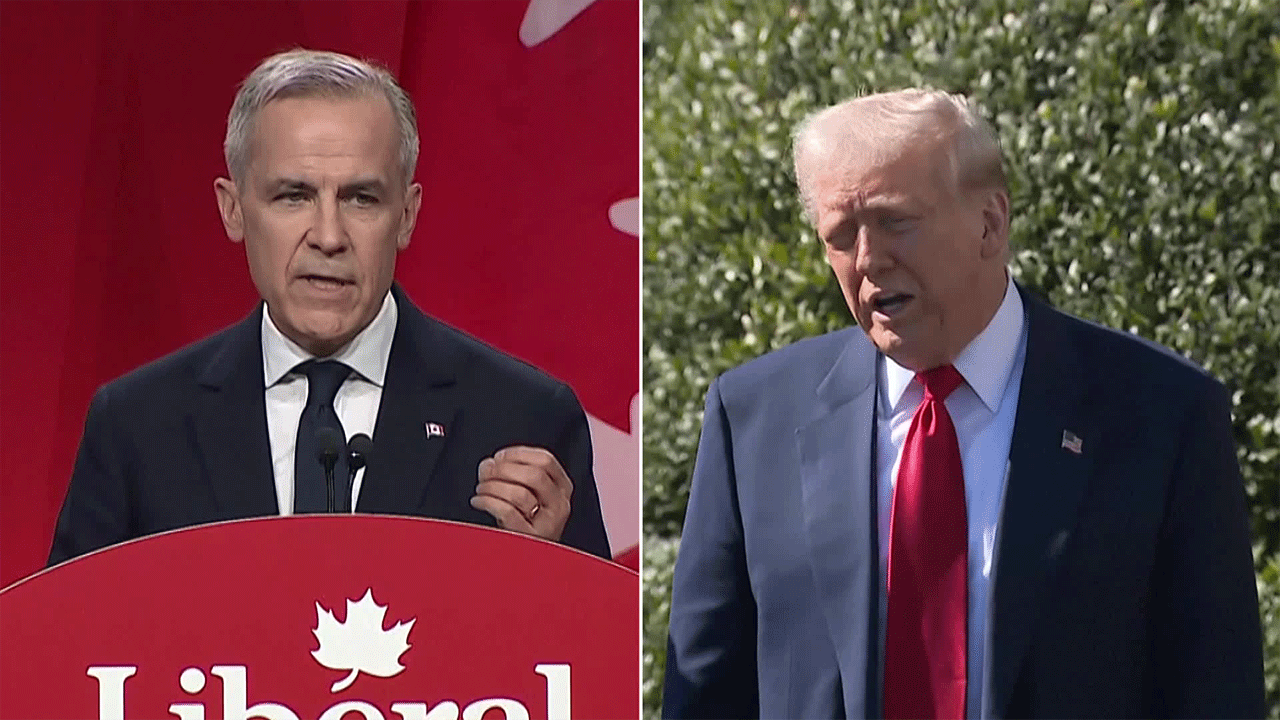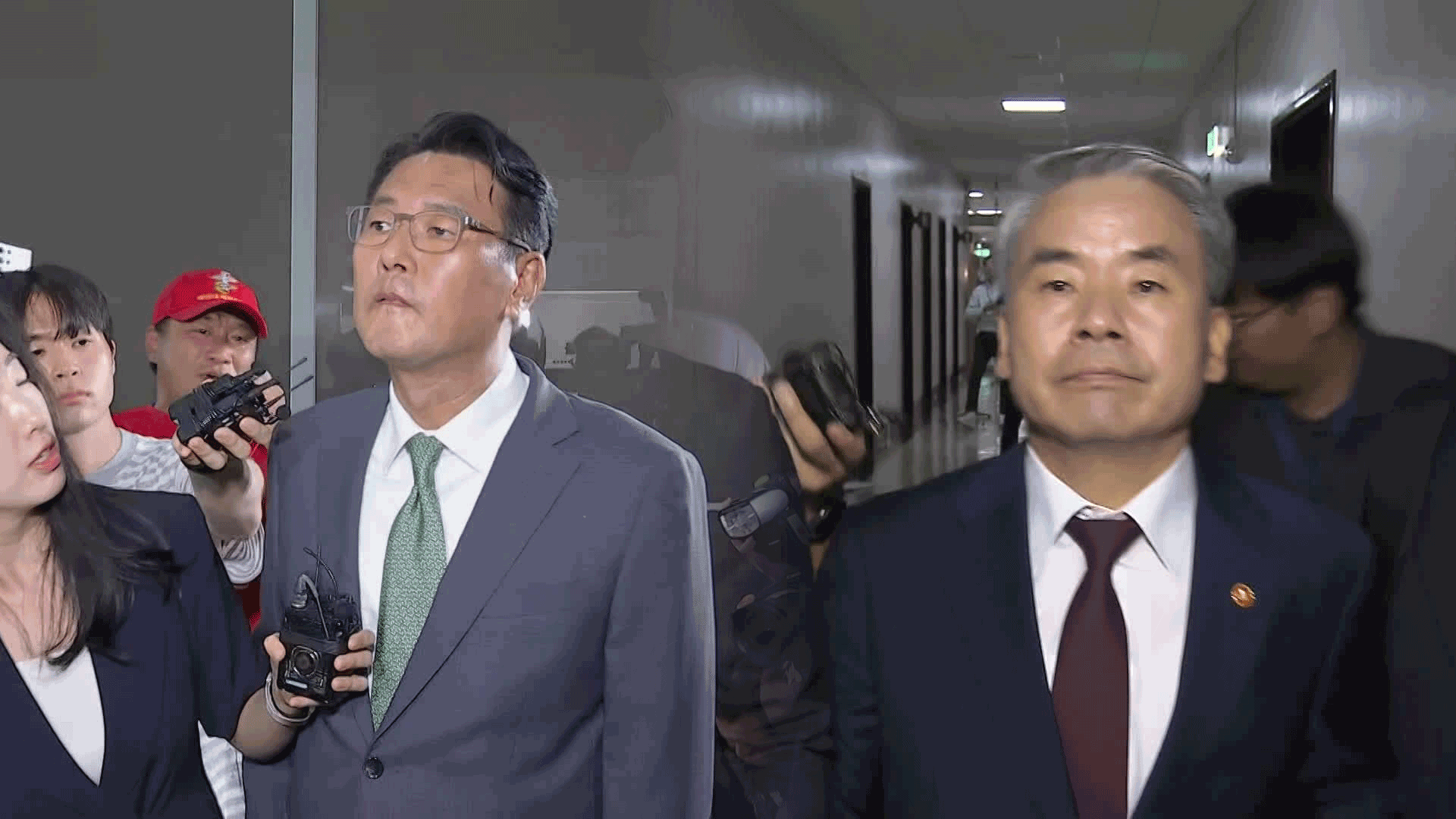[Anchor]
Amid the tariff frenzy of Trump, the United States and Canada, which had been exchanging retaliations and counter-retaliations, have temporarily suspended their strong confrontations.
President Trump dismissed concerns about an economic recession in the U.S. due to tariff policies, claiming that the country would actually experience a boom.
Reporter Yang Min-hyo reports.
[Report]
The Ontario province of Canada added a 25% surcharge on electricity exported to the U.S. right after President Trump threatened a 250% tariff on Canadian lumber and dairy products.
[Doug Ford/Canadian Ontario Premier/Mar. 10 local time: "Maximum pressure to maximize our leverage. That's why today, we're moving forward with a 25% surcharge on electricity exports."]
In return, Trump announced a counter-retaliation, stating that he would impose an additional 25% tariff on steel and aluminum specifically from Canada.
He also threatened to close down the Canadian automotive industry by raising tariffs.
After a back-and-forth online debate with the next Canadian Prime Minister, Canada decided to first suspend the electricity surcharge, and Trump also withdrew his plan for additional steel tariffs.
The reason for this de-escalation is the practical reality that both Canada, which relies on steel exports to the U.S., and the U.S., which would face an electricity price shock, would not benefit from a direct confrontation.
As economic anxiety grew due to the fluctuating tariff policies, Trump gathered corporate CEOs to promote the effects of tariffs.
Trump particularly held a test drive event for Tesla, which is facing a stock market crash and arson threats, assuring that the economy would boom.
[Trump/U.S. President: "(Do you think there will be a recession?) I don't see it at all. I think this country is going to boom."]
The White House also explained that the sharp decline in the stock market is just a 'momentary snapshot' and part of an 'economic transition,' but the New York stock market fell for the second consecutive day.
This is KBS News, Yang Min-hyo.
Amid the tariff frenzy of Trump, the United States and Canada, which had been exchanging retaliations and counter-retaliations, have temporarily suspended their strong confrontations.
President Trump dismissed concerns about an economic recession in the U.S. due to tariff policies, claiming that the country would actually experience a boom.
Reporter Yang Min-hyo reports.
[Report]
The Ontario province of Canada added a 25% surcharge on electricity exported to the U.S. right after President Trump threatened a 250% tariff on Canadian lumber and dairy products.
[Doug Ford/Canadian Ontario Premier/Mar. 10 local time: "Maximum pressure to maximize our leverage. That's why today, we're moving forward with a 25% surcharge on electricity exports."]
In return, Trump announced a counter-retaliation, stating that he would impose an additional 25% tariff on steel and aluminum specifically from Canada.
He also threatened to close down the Canadian automotive industry by raising tariffs.
After a back-and-forth online debate with the next Canadian Prime Minister, Canada decided to first suspend the electricity surcharge, and Trump also withdrew his plan for additional steel tariffs.
The reason for this de-escalation is the practical reality that both Canada, which relies on steel exports to the U.S., and the U.S., which would face an electricity price shock, would not benefit from a direct confrontation.
As economic anxiety grew due to the fluctuating tariff policies, Trump gathered corporate CEOs to promote the effects of tariffs.
Trump particularly held a test drive event for Tesla, which is facing a stock market crash and arson threats, assuring that the economy would boom.
[Trump/U.S. President: "(Do you think there will be a recession?) I don't see it at all. I think this country is going to boom."]
The White House also explained that the sharp decline in the stock market is just a 'momentary snapshot' and part of an 'economic transition,' but the New York stock market fell for the second consecutive day.
This is KBS News, Yang Min-hyo.
■ 제보하기
▷ 카카오톡 : 'KBS제보' 검색, 채널 추가
▷ 전화 : 02-781-1234, 4444
▷ 이메일 : kbs1234@kbs.co.kr
▷ 유튜브, 네이버, 카카오에서도 KBS뉴스를 구독해주세요!
- U.S.-Canada suspend tariffs
-
- 입력 2025-03-12 23:49:15

[Anchor]
Amid the tariff frenzy of Trump, the United States and Canada, which had been exchanging retaliations and counter-retaliations, have temporarily suspended their strong confrontations.
President Trump dismissed concerns about an economic recession in the U.S. due to tariff policies, claiming that the country would actually experience a boom.
Reporter Yang Min-hyo reports.
[Report]
The Ontario province of Canada added a 25% surcharge on electricity exported to the U.S. right after President Trump threatened a 250% tariff on Canadian lumber and dairy products.
[Doug Ford/Canadian Ontario Premier/Mar. 10 local time: "Maximum pressure to maximize our leverage. That's why today, we're moving forward with a 25% surcharge on electricity exports."]
In return, Trump announced a counter-retaliation, stating that he would impose an additional 25% tariff on steel and aluminum specifically from Canada.
He also threatened to close down the Canadian automotive industry by raising tariffs.
After a back-and-forth online debate with the next Canadian Prime Minister, Canada decided to first suspend the electricity surcharge, and Trump also withdrew his plan for additional steel tariffs.
The reason for this de-escalation is the practical reality that both Canada, which relies on steel exports to the U.S., and the U.S., which would face an electricity price shock, would not benefit from a direct confrontation.
As economic anxiety grew due to the fluctuating tariff policies, Trump gathered corporate CEOs to promote the effects of tariffs.
Trump particularly held a test drive event for Tesla, which is facing a stock market crash and arson threats, assuring that the economy would boom.
[Trump/U.S. President: "(Do you think there will be a recession?) I don't see it at all. I think this country is going to boom."]
The White House also explained that the sharp decline in the stock market is just a 'momentary snapshot' and part of an 'economic transition,' but the New York stock market fell for the second consecutive day.
This is KBS News, Yang Min-hyo.
Amid the tariff frenzy of Trump, the United States and Canada, which had been exchanging retaliations and counter-retaliations, have temporarily suspended their strong confrontations.
President Trump dismissed concerns about an economic recession in the U.S. due to tariff policies, claiming that the country would actually experience a boom.
Reporter Yang Min-hyo reports.
[Report]
The Ontario province of Canada added a 25% surcharge on electricity exported to the U.S. right after President Trump threatened a 250% tariff on Canadian lumber and dairy products.
[Doug Ford/Canadian Ontario Premier/Mar. 10 local time: "Maximum pressure to maximize our leverage. That's why today, we're moving forward with a 25% surcharge on electricity exports."]
In return, Trump announced a counter-retaliation, stating that he would impose an additional 25% tariff on steel and aluminum specifically from Canada.
He also threatened to close down the Canadian automotive industry by raising tariffs.
After a back-and-forth online debate with the next Canadian Prime Minister, Canada decided to first suspend the electricity surcharge, and Trump also withdrew his plan for additional steel tariffs.
The reason for this de-escalation is the practical reality that both Canada, which relies on steel exports to the U.S., and the U.S., which would face an electricity price shock, would not benefit from a direct confrontation.
As economic anxiety grew due to the fluctuating tariff policies, Trump gathered corporate CEOs to promote the effects of tariffs.
Trump particularly held a test drive event for Tesla, which is facing a stock market crash and arson threats, assuring that the economy would boom.
[Trump/U.S. President: "(Do you think there will be a recession?) I don't see it at all. I think this country is going to boom."]
The White House also explained that the sharp decline in the stock market is just a 'momentary snapshot' and part of an 'economic transition,' but the New York stock market fell for the second consecutive day.
This is KBS News, Yang Min-hyo.
-
-

양민효 기자 gonggam@kbs.co.kr
양민효 기자의 기사 모음
-
이 기사가 좋으셨다면
-
좋아요
0
-
응원해요
0
-
후속 원해요
0















이 기사에 대한 의견을 남겨주세요.